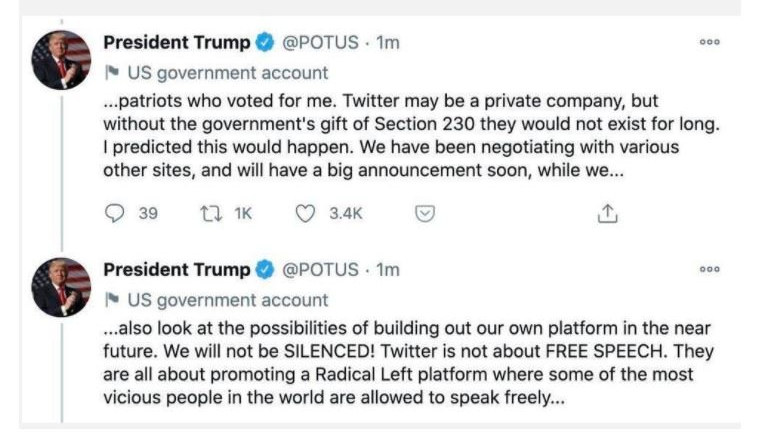DIGITAL DEMOCRACY
Twitter Permanently Bans Donald Trump. What Does That Mean For Us?
The social media platform decision to suspend the President’s @realDonaldTrump account “due to the risk of further incitement of violence” sparked questions on platforms’ role when it comes to free speech misinformation and content moderation.
By Francesca Scapolo
January 10, 2021
Ina blog post released on the 8th January 2021 by the Twitter Safety account, the social media giant said it had “permanently suspended” Donald Trump’s account, citing concerns over “the risk of the US president using the platform to incite further violence”. Twitch, Vimeo, Reddit and Shopify, Facebook and YouTube joined Twitter by suspending or limiting Trump’s access to their platforms.
These actions come after years of criticism that social media companies have not done enough to clamp down on Trump for spreading misinformation and inciting violence. A few hours from its account suspension, Trump tried to bypass it by tweeting from the official presidential account, @POTUS. He immediately shared a series of tweets accusing the social media company of “banning free speech” and attacking (again) Section 230 of the Communications Decency Act of 1995. According to Trump, that allows social media platforms like Twitter to get away with labelling or even suppressing his posts which spread lies about the 2020 US Election (Twitter quickly removed the tweets).
In an attempt to crack down on QAnon conspiracy theory, Twitter also banned some prominent Trump supporters like Michael Flynn, Sidney Powell and Ron Watkins as part of its broader efforts to tackle misinformation. Despite often resisting the calls to moderate its platform, Twitter has taken a stronger stance against conspiracy theories that have been tied to the violence of the past months. In addition to removing 7,000 accounts and limiting many others for dabbling in QAnon, the platform also restricted their content from appearing in its search functions and “Trending Topics” feature.
Some tweets from US President’s official @POTUS account
Deplatformisation vs free speech?
Banning Trump from posting on most social platforms will undoubtedly have an immediate and noticeable impact in decreasing his ability to reach and communicate directly with his followers. As previous examples have shown (yes, Trump is not the first one*), deplatformisation can lead to an audience reduction and a limitation in terms of reach, but it won’t dismantle the ecosystem of online extremism. Most importantly, it won’t prevent Trump from using alternative service providers to engage with his supporters (i.e. his app, which has a news section).
Twitter’s decision has been strongly criticised by Republicans, who saw it as a violation of Trump’s free speech and a decision against the US First Amendment. That has opened a debate on social media platforms’ power in influencing and limiting free speech: what does it mean when a corporation can censor a government official? Who should have the right to decide what we can and can’t say? Will Twitter now ban other government officials who keep inciting violence?
But according to an
in-depth analysis by The New York Times, it seems that the decision is entirely lawful as the First Amendment prohibits government censorship and does not apply to decisions made by private businesses (in this case, Twitter).
Those are primarily governed by section 230 of the Communications Decency Act, which again leaves Twitter free. As Bietti wrote in a recent piece, insisting on the bad cop vs good cop dualism when talking about Trump and Twitter is misleading as “speech regulation cannot be left exclusively to either of these two characters, because neither of them is — or can be — truly and fully aligned with the public interest, let alone trustworthy.” (Bietti, 2020)
It is also essential to bear in mind that those platforms are neither neutral nor apolitical, and there is no general requirement for them to become so.
What is the role of misinformation in all of this?
In addition to that, the recent shocking images from Washington and the suspension of Trump accounts from various social media platforms also spawned several insightful comments on the role misinformation plays. Early this year, a Harvard study found that mainstream news outlets are the largest amplifier of White House disinformation as most journalists are now on Twitter and tend to share their initial comments there.
General claims that the election has been stolen aren’t new;
they were already widespread in the last US elections. One of the main differences seems to be the strong endorsement of these claims by figures of authority, such as the President of the United States, which might have somehow made them more credible (Mercier, 2020). As pointed out in Horowitz’s book The Deadly Ethnic Riot, pre-riot rumours serve to channel and justify functions, and that is especially true in the case of social media where rumours of election theft committed by the opposite side have been effectively used to coordinate harmful and violent actions just a few days ago.
Misinformation is a serious matter, but that needs to be seen as a tool used to mobilise collective actions. In a piece published last October, Shannon McGregor, Assistant Professor in the Hussman School of Journalism and Media at the University of North Carolina, and Daniel Kreiss, Associate Professor in the Hussman School of Journalism and Media at the University of North Carolina, wrote something extremely relevant in this context:
“Journalists and voters should pay more attention to the motivations, content, and drivers of mis- and disinformation. Research on those examines how people might share information, regardless of its factual basis, to forge a collective identity with others, how actors strategically utilize racial divisions to further disinformation, and how far-right groups manipulate the media to spread radicalizing conspiracy theories, in turn driving misguided searches for “the truth.” (McGregor, 2020)
As stressed above, polarisation is rooted in social identity, which results in group identifications, a process that changes how we think and feels about ourselves and our (political) opponents. The campaign and election of Donald Trump in 2016 laid bare this fact of the American electorate, its successful rhetoric of “us versus them” tapping into a powerful current of anger and resentment (Mason, 2018).
Tweet from Emily Thorson, Associate Professor of Political Science at Syracuse University
Even if we could wave a magic wand and get rid of all the misinformation on social media, the forces that led to yesterday would not disappear. Misinformation is a tool wielded by those who desire to undermine democracy. It’s not the cause of that desire.
— Emily Thorson (@emilythorson) January 7, 2021
A move towards the harmonisation of content moderation across social media platforms?
The past months showed how social media platforms aren’t often transparent about their decisions regarding content moderation. That usually leaves them open to claims of censorship which hide the real costs of misinformation.
If we think about social media as a territory, or a civic public space, where political actors contend for power the same way they do in elections, the notion of content moderation becomes even more problematic. Content moderation isn’t just about content; it also involves behavioural aspects. An example is the #ProudBoys hashtag on Twitter, which has been flooded with images of LGBTQI+ pride, displacing posts made by neo-Nazis and white supremacists using the tag. A harmful hashtag that violated the platform’s terms and conditions turned into a positive campaign overnight. How should a platform deal with it?
Despite the frequent abdication of responsibility by social media companies, (including the missing endorsement of The Santa Clara Principles on Transparency and Accountability in Content Moderation that offers minimum standards for companies of these scales by almost all companies apart from Reddit), the actions taken by the different platforms in the past days, might suggest we are going towards harmonising content moderation policies. Such harmonisation across platforms on speech standards is essential as it’s bound for free expression.
We need to accept that perfect enforcement in terms of content moderation won’t probably ever be possible, at least at these platforms’ scale. However, we cannot allow the inevitability of errors to come and excuse all mistakes. Platforms should ensure that their decisions about speech are transparent and in line with global human rights standards.
* Facebook also banned Hezbollah because of its status as a US-designated foreign terror organisation, despite the party holding seats in Lebanon’s Parliament.
Francesca is currently completing a MA in Big Data in Culture and Society at King's College London, and working as Engagement Manager at Commonplace, a cause-led tech startup that operates a map-based website and mobile application that allows residents to comment on their local environment. She hold a MSc in Violence, Conflict and Development from SOAS and a BA in International Relations from the University of Trento. She loves hiking, playing table tennis and collecting books. At our institute, she leads our science communication efforts.
Read More


Watch Our Episodes






